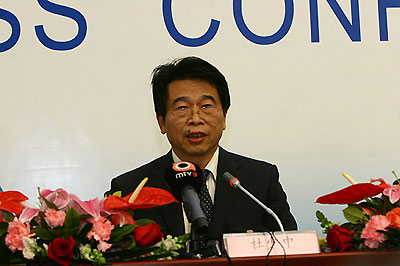BEIJING, February 27 -- Beijing did not move air quality monitoring stations in order to report better statistics during its preparation for the Olympic Games, a Beijing environment official said on Wednesday.
Answering a question whether Beijing shifted some monitoring stations from heavy-traffic areas to less polluted places, Du Shaozhong, spokesperson from Beijing Environmental Protection Bureau said all the locations of the monitoring stations can be found on the Bureau's official website.

Du Shaozhong, spokesperson from Beijing Environmental Protection Bureau said all the locations of the monitoring stations can be found on the Bureau's official website. [Sohu] |
"We did everything in accordance to relative national regulations, monitoring four types of major pullutant. We opened all the monitoring statistics to the general public on our website where you can find station locations and statistics," said Du.
"So there is no such thing we crossed out some stations in heavy-traffic areas," he said.
"We are developing our monitoring system step by step with more stations are being set up," he added.
Between 1998 and 2007, the amount of sulphur dioxide in the capital's air was down 60.8 percent, while carbon monoxide was cut 39.4 percent. Nitrogen dioxide was reduced 10.8 percent and particles were down 17.8 percent, according to Du.
Major pollutants down
Between 1998 and 2007, the amount of sulphur dioxide in the capital's air was down 60.8 percent, while carbon monoxide was cut 39.4 percent. Nitrogen dioxide was reduced 10.8 percent and particles were down 17.8 percent, said Du Shaozhong, the Beijing Environment Protection Bureau deputy head said, quoting the latest statistics.
Apart from the particles, he said the other indices had met with the national standards. He added Beijing would implement more stringent environmental standards to reduce pollutants in the coming months ahead of the August Olympics.
Du stressed the improving air quality required long-lasting and consistent efforts. "We have fought for the goal (of better air quality) for almost 10 years, and will continue our efforts in this path."
He outlined a new set of measures this year to contain air pollution. This included removing 2,300 cars, 1,500 buses and 2,000 cabs that failed to meet emission standards.
The bureau will continue to target industrial emissions by polluting businesses such as chemical, metallurgy and cement manufacturers, and require residents to contribute to emission-cutting by switching from coal to electricity.
New goals include cutting pollutants by another 50,000 tons this year, Du said.
As the host of the summer Olympics, Beijing has been using its resources to tackle air pollution, cited by many as a concern for the Games. In the past two years, the city has expanded public transport, tested a temporary traffic ban and relocated polluting factories.
"Under normal meteorological conditions, air quality during the Olympics will meet the national and World Health Organization (WHO) standards," Du said. "We will fulfill the environmental commitment we made when bidding for the Games," he said, stressing that "there is not much room for doubt".